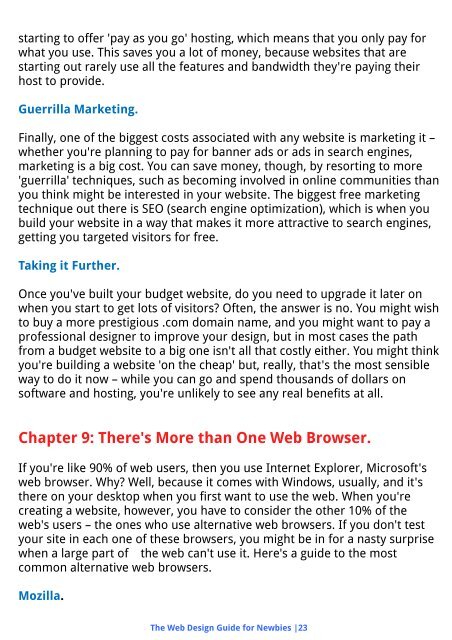Create successful ePaper yourself
Turn your PDF publications into a flip-book with our unique Google optimized e-Paper software.
starting to offer 'pay as you go' hosting, which means that you only pay for<br />
what you use. This saves you a lot of money, because websites that are<br />
starting out rarely use all the features and bandwidth they're paying their<br />
host to provide.<br />
Guerrilla Marketing.<br />
Finally, one of the biggest costs associated with any website is marketing it –<br />
whether you're planning to pay for banner ads or ads in search engines,<br />
marketing is a big cost. You can save money, though, by resorting to more<br />
'guerrilla' techniques, such as becoming involved in online communities than<br />
you think might be interested in your website. The biggest free marketing<br />
technique out there is SEO (search engine optimization), which is when you<br />
build your website in a way that makes it more attractive to search engines,<br />
getting you targeted visitors for free.<br />
Taking it Further.<br />
Once you've built your budget website, do you need to upgrade it later on<br />
when you start to get lots of visitors? Often, the answer is no. You might wish<br />
to buy a more prestigious .com domain name, and you might want to pay a<br />
professional designer to improve your design, but in most cases the path<br />
from a budget website to a big one isn't all that costly either. You might think<br />
you're building a website 'on the cheap' but, really, that's the most sensible<br />
way to do it now – while you can go and spend thousands of dollars on<br />
software and hosting, you're unlikely to see any real benefits at all.<br />
Chapter 9: There's More than One Web Browser.<br />
If you're like 90% of web users, then you use Internet Explorer, Microsoft's<br />
web browser. Why? Well, because it comes with Windows, usually, and it's<br />
there on your desktop when you first want to use the web. When you're<br />
creating a website, however, you have to consider the other 10% of the<br />
web's users – the ones who use alternative web browsers. If you don't test<br />
your site in each one of these browsers, you might be in for a nasty surprise<br />
when a large part of the web can't use it. Here's a guide to the most<br />
common alternative web browsers.<br />
Mozilla.<br />
The Web Design Guide for Newbies |23


